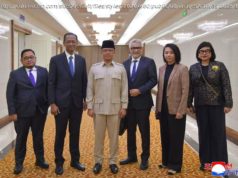The Republican-led US House of Representatives has overwhelmingly voted to impose new sanctions on North Korea, targeting its shipping industry and use of slave labour.
The Republican-led US House of Representatives has overwhelmingly voted to impose new sanctions on North Korea, targeting its shipping industry and use of slave labour.
Members approved the measure 419-1 as tensions continued to mount over Pyongyang’s advancing nuclear and ballistic missile programmes.
Admiral Harry Harris Jr, the top American military officer in the Pacific, has warned it is a question of when, not if, North Korea successfully builds a nuclear-tipped missile capable of striking the US.
The Senate must take up the measure next.
The bipartisan legislation is aimed at thwarting North Korea’s ambitions by cutting off access to the cash the regime needs to follow through with its plans.
The measure is sponsored by Rep Ed Royce of California, the Republican chairman of the House Foreign Affairs Committee, and Rep Eliot Engel of New York, the committee’s senior Democrat.
The bill bars ships owned by North Korea or by countries that refuse to comply with UN resolutions against it from operating in American waters or docking at US ports. Goods produced by North Korea’s forced labour would be prohibited from entering the United States, according to the legislation.
Anyone who uses slave labour that North Korea exports to other countries would be subject to sanctions under the International Emergency Economic Powers Act, the bill states. At times when the nation is facing unusual or extraordinary threats, the President has wide authority under the law, including the power to block or prohibit transactions involving property located in the US.
Mr Royce said companies from Senegal to Qatar to Angola import North Korean workers, who send their salary back to Pyongyang, earning the regime billions of dollars in hard currency each year
«This is money that Kim Jong-un uses to advance his nuclear and missile programme, and also pay his generals, buying their loyalty to his brutal regime, » he said. «That is what the high-level defectors that I meet with say. So let’s squeeze his purse.»
The bill also requires the Trump administration to determine within 90 days whether North Korea is a state sponsor of terrorism. Such a designation would trigger more sanctions, including restrictions on US foreign assistance.
In a separate but related move, Secretary of State Rex Tillerson pressed South-East Asian governments during a working lunch to ensure «leak-proof» enforcement of sanctions against North Korea and to prevent the pariah nation’s diplomats from conducting business that could benefit its weapons programmes.
Mr Tillerson called on foreign ministers of the 10-nation Association of South-East Asian Nations, or ASEAN, to «minimise» diplomatic relations with Pyongyang, «so that North Korea does not gain benefit from its diplomatic channels for its nuclear and missile aspirations, » senior State Department official Patrick Murphy said after Thursday’s meeting at the State Department.
That was the latest salvo in the Trump administration’s push to get the international community to intensify diplomatic and economic pressure on North Korea to dismantle its nuclear weapons programme before it can pose a direct threat to the American mainland.
Last weekend, a North Korean mid-range ballistic missile apparently failed shortly after launch, the third test-fire failure this month but a clear message of defiance. North Korean ballistic missile tests are banned by the United Nations because they are seen as part of the North’s push for a nuclear-tipped missile that can hit the US mainland.
The launch comes as both sides in the escalating crisis are flexing their military muscle. President Donald Trump has sent a nuclear-powered submarine and the USS Carl Vinson carrier strike group to Korean waters. North Korea last week conducted large-scale, live-fire exercises on its eastern coast.
The US and South Korea are installing a missile defence system and their two navies are staging joint military drills.
AP






